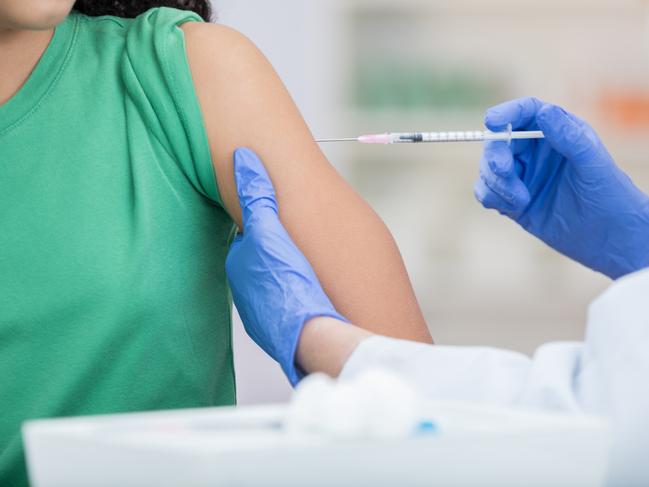Vaccine crisis leaves Australia’s immunisation record in tatters
Thousands of Australians are dying from the flu and meningococcal because lifesaving vaccines are not being approved, leaving immunisation at a new world low.
THOUSANDS of Australians are dying because access to crucial vaccines is being thwarted, sending the country’s immunisation record to a new world low.
Australia’s leading infectious diseases expert, Professor Robert Booy, said lives were being lost while the Pharmaceutical Benefits Advisory Committee, which decides which vaccines can be added to the National Immunisation Program, refused to bend.
Crucial vaccines — including against the flu and meningococcal B — were not being approved, leaving families to pick up the bill for jabs that should be federally funded.

“There could be as many as 4000 flu deaths this year, including a dozen children, while meningococcal kills 10 per cent of sufferers, and the B strain is at least half of that total burden,” Prof Booy said.
While state governments can independently fund vaccines, any programs are typically short-term and targeted at specific age groups, leaving most people with a hefty tab that can run into hundreds of dollars.
“Australia has been one of the leaders in the world in recent decades but we are dangerously slipping back, we don’t value vaccination as highly as other comparable countries like Canada or the UK,” said Prof Booy.
“For example, we don’t put any value on the social benefit, which includes herd immunity, and we discount the cost of long-term benefits of disease prevention.
“If you lose your legs to meningococcal, you’re not going to get them back. Your costs don’t come down over time.”
Speaking at The Economics of Prevention conference hosted by the Committee for Economic Development of Australia, Prof Booy called on the PBAC to urgently approve lifesaving vaccines.
“There is discretion within the PBAC to be more open to supporting vaccines, so I’d like to see that discretion exercised because when I speak to the Federal Minister for Health (Greg Hunt) he says his hands are tied, by law.”
The meningococcal B vaccine, Bexsero, has been put before the PBAC three times by its manufacturer GSK, but is yet to get the nod.

Prof Booy said overseas examples proved that Bexsero worked.
“The UK has had the vaccine for nearly four years and the number of cases has halved, and herd dramatically increased.
“In Portugal, they’ve been using it for two to three years and it is at a level where people should feel assured of its impact and safety in a big population.
“The impact looks to be about 75 per cent in the UK, that’s a very high rate of effectiveness.”
Pharmaceutical giant GSK launched its own paper at Tuesday’s conference, calling on Australia to “better align with international practice and community values”.
“The narrow healthcare system perspective typically limits the scope of review to only the benefits and costs relevant to the individual … but this disregards the broad societal impact of immunisation, including disability and welfare,” The Value of Vaccines paper said.
Currently, only South Australia funds the B vaccine in a targeted program. Queensland continues to refuse to fund B.
In April this year, following a Courier-Mail pro-vaccination campaign, the Federal Government introduced free vaccines against the A, C, W, Y strains of meningococcal.
The disease is transferred through bacteria in the nasal passages and causes the body’s organs to shut down within hours.

Meningococcal Queensland spokesperson Kirsten McGinty, whose 20-year-old daughter Zoe died of the W strain in 2017, said people needed to be vaccinated against all five strains to be protected.
“The B vaccine is available, it works, but it’s costing Queensland families up to $500 per child. This is simply not good enough. Meningococcal can strike at any age.”
In Queensland, there have been 262 cases of meningococcal since 2014, and experts warn that an epidemic is looming.
While figures released this week show the number of fully immunised Australian children has reached 95 per cent, vaccination against deadly diseases for other Australians is as low as 49 per cent.
Originally published as Vaccine crisis leaves Australia’s immunisation record in tatters
